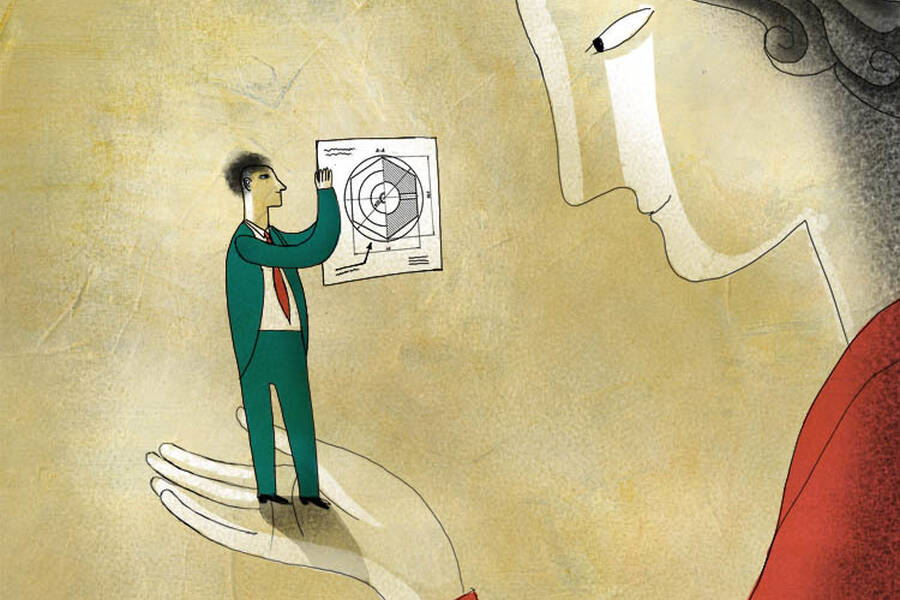The times, they are a-changing.
Brick-and-mortar retailers are on life support, while tech giants like Alphabet, Facebook, and Amazon set their formidable sights on the transportation, television, and grocery industries. All the while, income inequality is growing, the American population is aging, and labor market participation is down. The planet is warming. And, of course, the robots are coming.
Is your organization ready to weather a shifting economy? Are you? Here, our faculty offer five ways to prepare for rapid change.
1. Discourage a Corporate Culture of Excessive Conformity.
A strong corporate culture can be a boon for morale and efficiency. But if it gets too strong, it can scare away dissenters, who may be important for finding new solutions should the market change.
A few years ago, Alvaro Sandroni, a professor of managerial economics and decision sciences at Kellogg, and his colleagues built a model to explore how the strength of a company’s culture can impact its competitiveness. In their model, a strong common culture—one with clearly established norms—tends to attract other likeminded individuals. Over time, the organization becomes even more conforming, as employees who are a good cultural “fit” for the organization disproportionately gravitate toward it, while those with differing perspectives go elsewhere.
During periods of economic stability, conformity is not a bad thing. In fact, it can be helpful. Coordination and communication become more seamless when colleagues share a common vision for how to move forward.
But when economic conditions change and the status quo is no longer desirable, conformity can become a disadvantage. Strong cultural norms make it less likely that anyone will stumble across a new—perhaps better—opportunity.
2. Expect That the Unexpected May Lead to Unethical Behavior.
Disruption—whether within your company or by a competitor—can make people nervous. It’s also worth nothing that anxiety can make people feel more selfish, opening the door to unethical behavior.
In a series of six studies, Maryam Kouchaki, an assistant professor of management and organizations at Kellogg, finds that participants who have been induced to feel anxious—by listening to the theme song from Psycho, for instance—are more likely to cheat when money is on the line than those who are feeling carefree. Such participants are also more likely to feel comfortable with hypothetical actions such as stealing office supplies.
And the link between anxiety and ethics goes beyond the lab. The researchers also find that people who say they feel anxious at work are more likely to have actually engaged in unethical behaviors, as reported by their supervisors.
Kouchaki advises that organizations wishing to temper anxiety consider both its physical and mental components. Sure, splurge on the standing desks or yoga retreats to get those endorphins flowing. But it is also critical to foster “psychological safety” by making people feel comfortable voicing their thoughts.
“Because anxiety can be caused by deep ambivalence,” says Kouchaki, “there’s a social element to this. There has to be a way for people to share, get advice, or discuss their issues.”
“Sometimes I hear people talk about how companies are going to be doing this. I think, no, we’re doing it.” - Tom O’Toole
3. Create Urgency around Innovation.
Is your company ready if disruption arrives and takes aim at your core business?
“Most companies spend decades building up a core business and the bureaucracy to support that core business,” says Mark Achler, an adjunct lecturer of innovation and entrepreneurship at Kellogg, as well as a serial entrepreneur.
This is, after all, the proven strategy that got the organization where it is today. “But it also means that everybody’s time and attention is focused on that core business. So if you don’t create urgency around innovation, then it’s really easy to put it off,” says Achler.
But the best of intentions mean little without resources. Achler suggests formally tying innovation to employee compensation, as well as providing intrapreneurs with a protected budget and guaranteed access to necessary resources, such as accounting and legal services.
And companies need to be able to commit to innovation over the long haul.
“Innovation’s not one- or two-year chunks,” Achler says. “You’ve got to have a three- to five-year time horizon, because it takes time to source and vet ideas.”
4. Overhaul Your Marketing Department.
If you are waiting for data-driven targeted marketing to fully come into its own before shaking up your customer-segmentation efforts, wait no longer. The future is already here.
Even just a few years ago, customer segmentation still ruled the day. Today, at least at data-savvy companies, the “segment of one” has fully arrived—on a large scale, optimized dynamically in real time.
“Sometimes I hear people talk about how companies are going to be doing this. I think, no, we’re doing it,” says Tom O’Toole, a clinical professor of marketing and former CMO of United Airlines, where he also was a senior vice president and president of MilePlus. “And others are doing it as well.”
For marketing departments that have not yet made the leap into the new era, O’Toole argues that a full overhaul may be in order—one that collapses functional distinctions among, say, creative, media, and IT.
“I see companies continuing to retrofit and adapt and incrementally change conventional marketing organizations—but ultimately what is required is a restructuring of the marketing organization, which is a wrenching transformation. The conventional marketing organization is an artifact of a prior era.”
5. Give “Overvalued” Stocks a Second Look.
Of course, disruption doesn’t just affect individual companies. It is a major player in the stock market, too.
For example, Tesla stock is hot—some would say irrationally hot, even if the promise of self-driving cars is super appealing. But why?
“One of the most enduring puzzles in finance is this fact that so-called ‘growth-stocks’ are typically overvalued relative to some measures of fundamentals, and have low returns,” says Dimitris Papanikolaou, an associate professor of finance at Kellogg.
Research by Papanikolaou and his colleagues suggests that, rather than being irrational, investors are responding to an unpredictable future, in which game-changing technologies lead to a few winners—and a whole lot of losers. If a company like Tesla succeeds in ushering in an era of self-driving cars, after all, Tesla stock will go through the roof, while the values of other transportation companies may plummet.
“If people have this fear of missing out or being left behind, they will view investing in something like Tesla as a way of hedging against future disruptions and inequality,” he says.
So while other investment strategies may offer more promising ways of beating the market, they also make it less likely you will end up picking an industry-shaping winner.
Featured Faculty
E.D. Howard Professor of Political Economy; Professor of Managerial Economics & Decision Sciences
Professor of Management and Organizations; Management and Organizations Department Chair
Adjunct Lecturer of Management & Organizations
Clinical Professor of Marketing, Associate Dean for Executive Education
John L. and Helen Kellogg Professor of Finance




